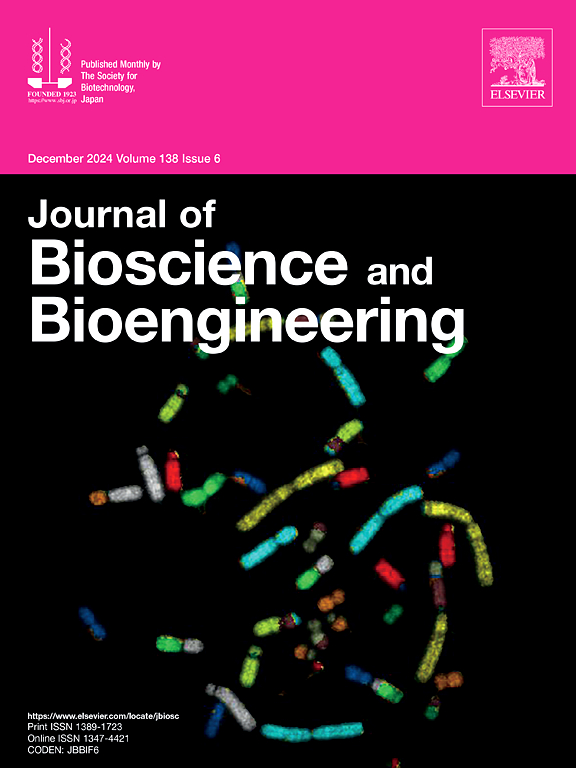Efficient yeast breeding using a sake metabolome analysis for a strain evaluation
IF 2.9
4区 生物学
Q3 BIOTECHNOLOGY & APPLIED MICROBIOLOGY
引用次数: 0
Abstract
Breeding sake yeast typically involves generating several gene mutants through UV irradiation or mutagen treatment and selecting those with desired traits based on indicators such as analog resistance. However, this approach often alters traits beyond the target trait due to the random and numerous mutations introduced. To address this issue, we used a previously established metabolome analysis, a sake metabolome analysis, to evaluate the selected yeast strain. After screening for target traits, 110 sake yeast candidates were cultured in yeastnitrogen-based liquid medium using test tubes. The contents were extracted and subjected to comprehensive metabolite analysis through sake metabolome analysis. A phylogenetic tree was then constructed using the metabolome analysis data, enabling the selection of candidate yeasts with only the target traits modified and other traits similar to the parental strain. Selected 21 candidate strains underwent fermentation tests, and the resulting sakes were analyzed using liquid chromatography quadrupole/time-of-flight mass spectrometry (LC-Q/TOF-MS). The findings suggested that the metabolomic data of yeast extracts obtained by simple small-scale culture was similar to the data of resulting sake in the larger-scale fermentation tests. This underscores the utility of metabolome analysis data of yeast extracts in the yeast breeding process, marking the first report proposing the use of the sake metabolome analysis method for yeast breeding.
利用清酒代谢组分析进行菌种评价的高效酵母育种。
清酒酵母的培育通常包括通过紫外线照射或诱变剂处理产生几个基因突变体,并根据类似物抗性等指标选择具有所需性状的基因。然而,由于引入了随机和大量的突变,这种方法经常改变目标性状以外的性状。为了解决这个问题,我们使用了先前建立的代谢组分析,清酒代谢组分析,来评估选定的酵母菌株。筛选目标性状后,利用试管在酵母氮基液体培养基中培养110株清酒候选酵母。提取其成分,通过清酒代谢组分析进行综合代谢物分析。然后利用代谢组学分析数据构建系统发育树,从而选择候选酵母,仅修改目标性状,其他性状与亲本菌株相似。选择21株候选菌株进行发酵试验,并采用液相色谱四极杆/飞行时间质谱(LC-Q/TOF-MS)对结果进行分析。结果表明,通过简单的小规模培养获得的酵母提取物的代谢组学数据与大规模发酵试验获得的清酒数据相似。这凸显了酵母提取物代谢组分析数据在酵母育种过程中的实用性,标志着首次提出将清酒代谢组分析方法用于酵母育种。
本文章由计算机程序翻译,如有差异,请以英文原文为准。
求助全文
约1分钟内获得全文
求助全文
来源期刊

Journal of bioscience and bioengineering
生物-生物工程与应用微生物
CiteScore
5.90
自引率
3.60%
发文量
144
审稿时长
51 days
期刊介绍:
The Journal of Bioscience and Bioengineering is a research journal publishing original full-length research papers, reviews, and Letters to the Editor. The Journal is devoted to the advancement and dissemination of knowledge concerning fermentation technology, biochemical engineering, food technology and microbiology.
 求助内容:
求助内容: 应助结果提醒方式:
应助结果提醒方式:


